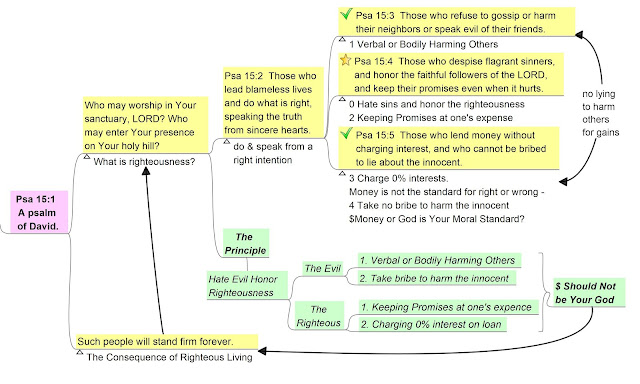Psalm 15 shows us that if you choose God over money, you will be with God forever.The consequence of righteous living is standing forever in the sanctuary of God. The progression of Psalm 15 shows us what is right and wrong and are all related to money. The righteous keeps promise at his cost and charges zero interests on loans whereas the sinful takes bribes to lie, gossip and harms others implying doing anything just to get money.
Here is the mind-map:
The biblical text is the NLV version.

Verse 2 tells us the blameless qualifies to be in God's sanctuary. Who can be blameless? Only those who accept Jesus Christ's redemption. But what does it look like? The 2nd part of the verse shows us, doing what is right and speaking the truth from the heart without manipulative intent.
Verse 3 shows us the opposite of speaking the truth, which is gossip and speaking evil of others and doing harm to them.
Verse 4 shows the principle of righteousness --- hating evil and honoring righteous and points us yet another aspect of doing the right thing, namely, to keep promises made even when it hurts, a typical case will be at one's expense or costs.
Verse 5 makes the clear the intent, it is all about money such as charging zero interests (a good case) and taking bribes (a negative case).
The green color part of the mind-map is the lesson we learned from the study of this psalm. Never make $money$ your God. Never use $money$ as the standard of right and wrong and do all things just to get more $money.
Righteous is defined by God and we should faithfully follow it (verse 4) and the outcome will be an eternal presence with the Lord. The psalm is not teaching about salvation by work but the characteristics of those saved by grace.
Lim Liat (c) 8 Aug 2019